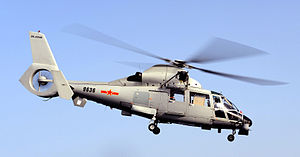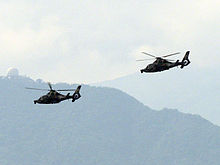Harbin Z-9
| Z-9 | |
|---|---|
 A Chinese naval Z-9 departs HMS Cornwall | |
| General information | |
| Type | Medium multi-purpose utility helicopter |
| National origin | China |
| Manufacturer | Harbin Aircraft Manufacturing Corporation |
| Status | In service |
| Primary users | People's Liberation Army Ground Force |
| Number built | 200+ |
| History | |
| Manufactured | 1981–present |
| Introduction date | 1994 |
| First flight | 1981 |
| Developed from | Eurocopter AS365 Dauphin |
| Variants | Harbin Z-19 |
The Harbin Z-9 (NATO reporting name "Haitun", Chinese: 海豚; lit. 'Dolphin'[1]) is a Chinese military utility helicopter with armed variants, manufactured by Harbin Aircraft Manufacturing Corporation. It is a license-built variant of the French Eurocopter AS365 Dauphin.
Design and development
[edit]The first Z-9 flew in 1981, and was built in China from components supplied by Aérospatiale as part of a production patent bought on 15 October 1980.[2] On 16 January 1992, the indigenous variant Z-9B, constructed with 70% Chinese-made parts, flew successfully. The flight test was completed in November 1992 and the design was finalized a month later. Z-9B production began in 1993 and entered PLA service in 1994.[3]
The Z-9B features an 11-blade Fenestron faired-in tail rotor with wider-chord, all-composite blades replacing the 13-blade used in the original AS365N. As a light tactical troop transport, the Z-9 has the capacity to transport 10 fully armed soldiers. Generally the Z-9 is identical to the AS365N Dauphin, though later variants of the Z-9 incorporate more composite materials to increase structural strength and lower radar signature.
The helicopter has a four-blade main rotor, with two turboshaft engines mounted side by side on top of the cabin with engine layout identical to the AS365N. The Z-9 teardrop-shaped body features a tapered boom to the tail fin, with rounded nose and stepped-up cockpit, retractable gear, and all flat bottom.
In 2002, Harbin obtained Chinese certification for the new H410A variant of the Z-9, which features more powerful Turbomeca Arriel 2C turboshaft engines; Eurocopter issued official objections to Harbin's decision to continue production in spite of the license-production agreement having expired, leading to a period of highly sensitive international negotiations to resolve the dispute.[4]
Variants
[edit]An armed variant has been fielded by the PLA since the early 1990s as the Z-9W, with pylons fitted for anti-tank missiles. These helicopters lack the maneuverability and survivability of a proper attack helicopter, and merely provide a stopgap during the development of the Z-10. The latest armed version, the Z-9W, was introduced in 2005 and has night attack capabilities, with an under-nose low-light TV and infra-red observing and tracking unit.
The naval version introduced in the 1990s is known as the Z-9C. As well as SAR and ASW duties, the Z-9C can be fitted with an X-band KLC-1 surface search radar to detect surface targets beyond the range of shipborne radar systems.[5]

- Z-9
- License-produced variant of the French AS.365N1.
- Z-9A
- Kit-built variant of the AS.365N2.
- Z-9A-100
- Prototypes for domestic market versions with WZ8A engines. First flight 16 January 1992, approved 30 December 1992.
- Z-9B
- Production version based on Z-9A-100. Multi-role.

- Z-9C
- License-produced variant of the Eurocopter AS.565 Panther for the PLA Naval Air Force.
- Z-9EC
- ASW variant produced for the Pakistan Naval Air Arm. Configured with pulse-compression radar, low frequency dipping sonar, radar warning receiver and doppler navigation system, it is also armed with torpedoes for use aboard Pakistan Navy's Zulfiquar-class frigates.[6]
- Z-9G
- Export version of the WZ-9 gunship.[7]
- Z-9EH
- Transport, emergency and/or passenger variant.[8]
- Z-9W
- Also known as WZ-9. Armed version with optional pylon-mounted armament, gyro stabilization and roof-mounted optical sight. Export designation Z-9G, roof-mounted sight optional.[7] First flown in 1987, with the first weapons tests in 1989.[9]

- Z-9WA
- A newer night-capable version has been built with nose-mounted FLIR. July 2011, Xinhua News Agency released a photo of Z-9WA firing AKD10 air-to-ground missile.[10] Incorporates a domestic Chinese helmet mounted sight that is compatible with anti-tank missiles such as HJ-8 /9/ 10, as well as light anti-ship missiles such as C-701/703 and TL-1/ 10 when they are used as air-to-surface missiles, air-to-air missiles such as TY-90 and other MANPAD missiles for self-defense.[11]
- Z-9Z
- Prototype reconnaissance version.[7]
- H410A
- Version with 635 kW WZ8C turbo-shaft engines. First flight September 2001, CAAC certification 10 July 2002. One is currently being fitted with a new Mast-Mounted Sighting (MMS) system.

- H425
- Newest VIP version of the H410A.
- H450
- Projected development.
- Z-19
- Attack helicopter development with tandem seats. The Z-19 shares the same powerplant as the Z-9WA.
Operators
[edit]

- Bangladesh Navy (on order)[12][13][14][15]
- People's Liberation Army Air Force[16]
- People's Liberation Army Ground Air Force
- People's Liberation Army Naval Air Force[16]

Specifications (Z-9B)
[edit]
Data from [21]
General characteristics
- Crew: 1 or 2 pilots
- Capacity: 10 passengers or 1,900 kg (4,189 lb) payload internal, 1,600 kg (3,527 lb) payload slung
- Length: 12.11 m (39 ft 9 in)
- Height: 4.01 m (13 ft 2 in)
- Empty weight: 2,050 kg (4,519 lb)
- Max takeoff weight: 4,100 kg (9,039 lb)
- Powerplant: 2 × Zhuzhou Aeroengine Factory WZ-8A turboshaft, 632 kW (848 hp) each
- Main rotor diameter: 11.94 m (39 ft 2 in)
- Main rotor area: 111.98 m2 (1,205.3 sq ft) swept area
Performance
- Maximum speed: 305 km/h (190 mph, 165 kn)
- Cruise speed: 260 km/h (160 mph, 140 kn)
- Ferry range: 1,000 km (620 mi, 540 nmi) with internal auxiliary tank
- Endurance: 5 hours
- Service ceiling: 4,500 m (14,800 ft)
Hovering ceiling in ground effect: 2,600 m (8,530 ft)
Hovering ceiling out of ground effect: 1,600 m (5,249 ft)
Armament
- Guns: two fixed 23 mm Type 23-2 (AM-23) cannon on attack variants.
- Hardpoints: Pylons for rockets, gun pods, ET52 torpedo, HJ-8 anti-tank missiles, or TY-90 air-to-air missiles.
See also
[edit]Related development
Aircraft of comparable role, configuration, and era
- Sikorsky SH-60 Seahawk
- Eurocopter HH-65 Dolphin
- Agusta A109
- AgustaWestland AW139
- Bell Huey family
- Bell 222/230/430
- Sikorsky S-76
- TAI T625
- HAL Dhruv
References
[edit]- ^ Parsch, Andreas; Aleksey V. Martynov (2008). "Designations of Soviet and Russian Military Aircraft and Missiles". Designation-Systems.net. Retrieved 13 April 2010.
- ^ "哈尔滨飞机工业集团有限责任公司". Hafei.com. Archived from the original on 3 April 2015. Retrieved 16 November 2013.
- ^ "Z-9 Utility Helicopter". SinoDefence.com. 6 January 2007. Archived from the original on 30 December 2006.
- ^ "China Approves Re-engine Z-9 Twin." Flight International, July 2002. p. 43.
- ^ "Z-9C (AS 565 Panther) Naval Helicopter". SinoDefence.com. 28 July 2007. Archived from the original on 17 March 2008. Retrieved 26 March 2008.
- ^ http://thenews.jang.com.pk/updates.asp?id=87912[dead link]
- ^ a b c "Worldwide Equipment Guide – Volume 2: Airspace and Air Defense Systems" (PDF). United States Army Training and Doctrine Command. December 2011. p. 2-14 – via Defense Technical Information Center.
- ^ "航空工业哈尔滨飞机工业集团有限责任公司". hafei.com. Archived from the original on 13 April 2018. Retrieved 16 April 2018.
- ^ "Harbin Z-9W Attack Helicopter". Army Technology. 15 June 2011. Retrieved 16 November 2013.
- ^ "Z-9WA attack helicopter". AirForceWorld.com. Archived from the original on 9 September 2011. Retrieved 12 July 2011.
- ^ "Z-9 HMS". China Internet Information Center. Archived from the original on 9 August 2016. Retrieved 16 April 2018.
- ^ "World Air Forces 2020". Flightglobal Insight. 2020. Retrieved 10 December 2019.
- ^ "Bangladesh Navy set to buy Z-9c asw helicopter". Helihub. 5 July 2013. Retrieved 5 July 2013.
- ^ "Bangladeshi Navy orders two Do 228s for MPA mission". Flight Global. Retrieved 12 October 2017.
- ^ "Bangladesh Naval Aviation". aeroflight.co.uk. Retrieved 7 May 2016.
- ^ a b c d e f g h i j k l "World Air Forces 2015". Flightglobal Insight. 2015. Archived from the original on 19 October 2017. Retrieved 4 January 2015.
- ^ Las Fuerzas Armadas de Guinea Ecuatorial se dotan con dos helicópteros chinos Harbin Z-9
- ^ "Ghana Air Force receives Z-9 helicopters". 5 October 2015.
- ^ "Aged air force inventory highlights Mali's weakness". flightglobal.com. Retrieved 12 January 2015.
- ^ "What is Happening in Myanmar - Documenting Equipment Losses in the Myanmar Civil War". 25 December 2023.
- ^ Gordon, Yefim; Dmitry Komissarov (2008). Chinese aircraft. Manchester: Hikoki. ISBN 9-781902-109046.
